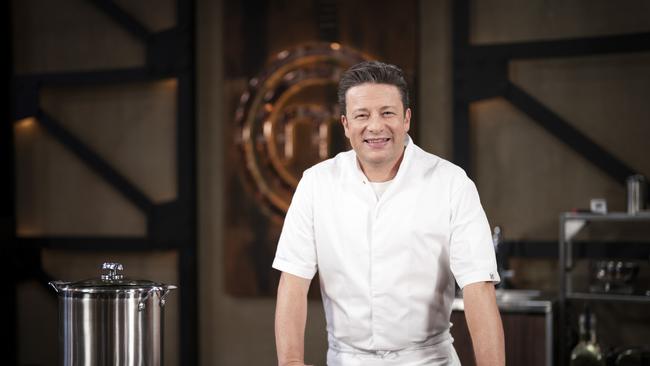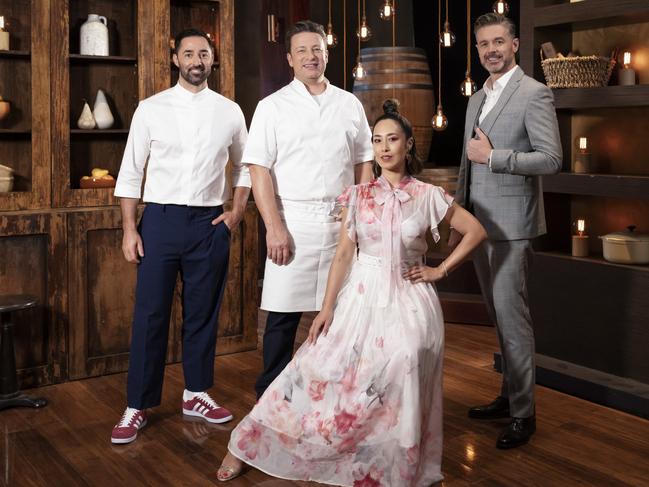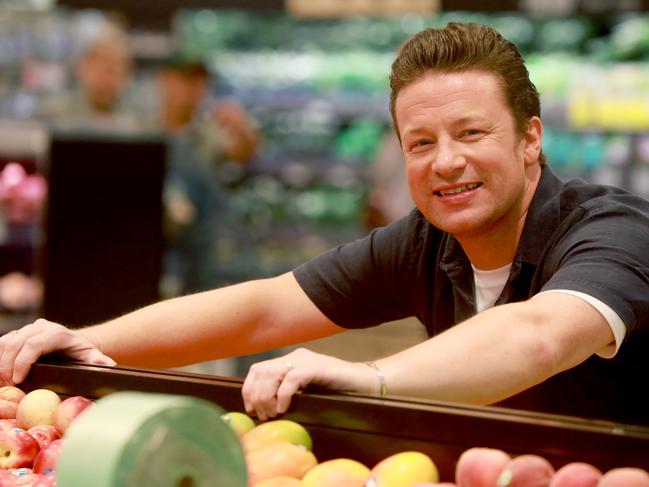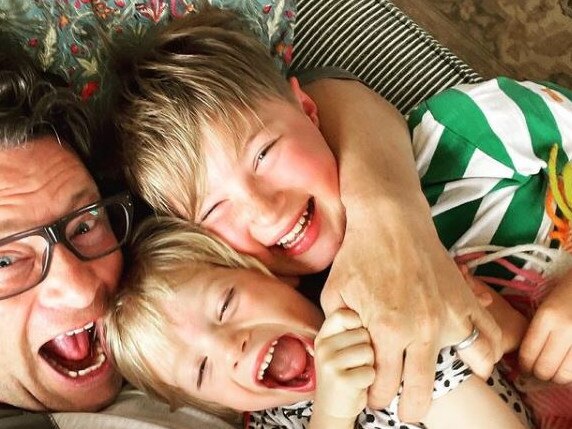Jamie Oliver’s mission to teach Aussie kids how to cook 10 meals before they leave school
The superstar chef is back in Australia for the new season of MasterChef, with plans to soon launch his own Aussie show.

Fiona Byrne
Don't miss out on the headlines from Fiona Byrne. Followed categories will be added to My News.
British super chef Jamie Oliver says he still suffers from impostor syndrome after 23 years in front of the camera.
Oliver, 47, who has plans to soon film a new show in Australia and remains a firm believer that every Australian child should be able to cook at least 10 meals by the time they leave school, features in the first two episodes of the new season of MasterChef Australia.
On the eve of the show’s launch, Oliver spoke to Fiona Byrne about food, family, eating well on a budget, the meaning of success and his love of Australia.
FB: Welcome back to MasterChef Australia – it’s been 10 years.
JO: I’ve loved it, how could I not? It’s been like coming home. The crew is extraordinary; the judges are 100% legit, great fun, supportive and individual in their own right; and the contestants are just brilliant – it’s like every little flavour of Australia happening right here. We had such a laugh and there was so much love. I really felt confident that we kicked off the series well.
FB: Any plans to come back again soon?
JO: I am hoping MasterChef will have me back. I also want to do a unique series just for Australia, which I’m hoping might happen. But it’s always a joy to come to Australia – I feel it’s the easiest place for me to cook the way I cook and be the way I am naturally.

FB: Do you see yourself as a chef or as a celebrity?
JO: I always see myself as a chef and I still have impostor syndrome. But after 23 years in broadcasting, lots of nice things have come out of building relationships with people in front of and behind the camera. I’m really enjoying this next chapter of my life at the moment, which is really nice.
FB: What does success mean to you?
JO: Success for me is being useful in people’s lives and in their homes. I think it’s something like 1 in every 5 people in Australia have a Jamie Oliver book, it’s extraordinary and humbling. It’s often in their kitchen, about a metre-and-a-half away from where they cook, which is just so lovely. I also know some pass the books down to their kids, who are now cooking from them, making a homemade crumble or a lovely roast dinner or a beautiful fish pie or a curry – that’s so special. Yep, I have a brilliant job, I’m very lucky.

FB: Is there anything on your bucket list still to achieve?
JO: There is so much I want to do before I kick the bucket. I think it’s only kind, logical, sensible and fair to promise that every Australian kid can leave school at 16 knowing how to cook 10 things that will protect them on the journey into adulthood. They need to know the basics of nutrition, where food comes from, how it affects their body, and teach them how to budget their Aussie dollar to go as far as possible. I don’t see why that can’t be a law: it’s just supporting good health and Australian culture. Not to mention there’s no better way to teach maths than baking; there’s no better way to teach history than cooking; there’s no better way to teach biology than growing and cooking. It would even make the country money, because we know that if you can look after yourself better and you’re healthier, then you’re more productive and that’s only good for Australian GDP. So, you know, that would be the best achievement in my lifetime. I still don’t know why no one’s fighting for that. I don’t understand why it can’t happen in the UK either, but I’ll keep plugging away.
FB: Everyone’s belts are having to tighten at the moment, Australians included. Can healthy meals be budget friendly?
JO: My UK series £1 Wonders – which also came over here, called Meals For Less – was about responding to the pressures of budgets and the increasing cost of ingredients, and it resonated massively, the feedback’s been super powerful. Ultimately it comes back to being useful again – now is the time people really need these recipes. In a time when people are cooking less, we actually need people to cook more in order to save money and be healthier;
and feel more pride in cooking delicious Aussie produce.

FB: As a father of five, how do you keep your children grounded?
JO: Through the way we act as a family at home; the values we treasure; the manners we try to instil, and the hard work ethic we teach. You know, we do our best to keep it real, try not to mollycoddle too much, and make sure they’re reminded of all the things that were important to me growing up in a pub.
FB: Which Aussie chefs do you admire?
JO: There are so many extraordinary Aussie chefs, and the consistency of great chefs evolving through the next generations has been amazing to watch over the past 20 years. One of the most interesting is Josh Niland who wrote The Whole Fish Cookbook. Then there are people like Morgan McGlone and his wife Trisha Greentree who are doing extraordinary things. Even Tobie Puttock, who’s not working in the kitchen anymore, but has this incredible food business that delivers high quality food to your home, he’s sort of reimagining the quality convenient food market in a really interesting way. Then there are people like Stephanie Alexander, who’s always joyful, and Tetsuya Wakuda remains The Don.
FB: How important are shows like MasterChef?
JO: For me, MasterChef Australia is very important. TV formats are normally short and sharp, they don’t have the luxury of time. But MasterChef Australia is filmed over a long period of time, so you genuinely see a transformation in the contestants – in confidence, style and technique. So yeah, it’s very special.
MasterChef Australia: Secrets & Surprises launches on Channel 10, Monday, May 1, 2023.





